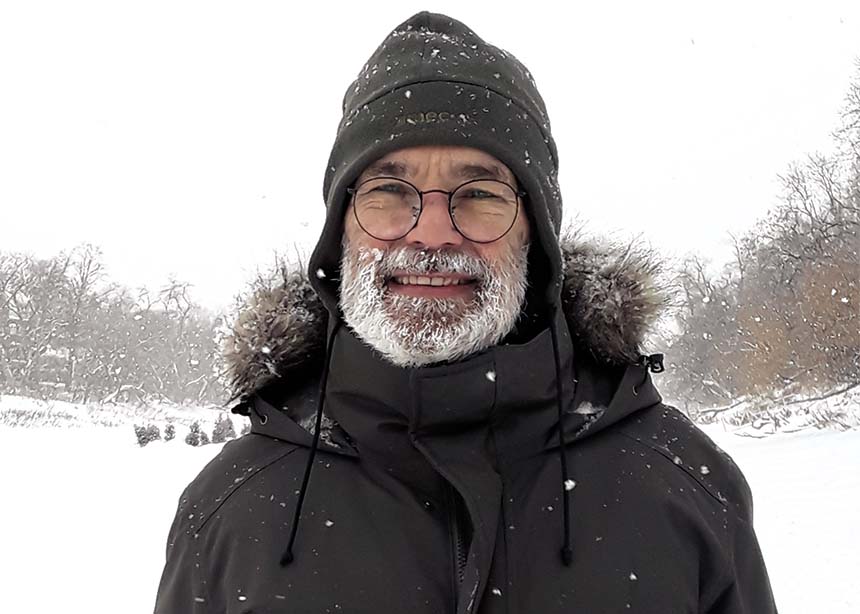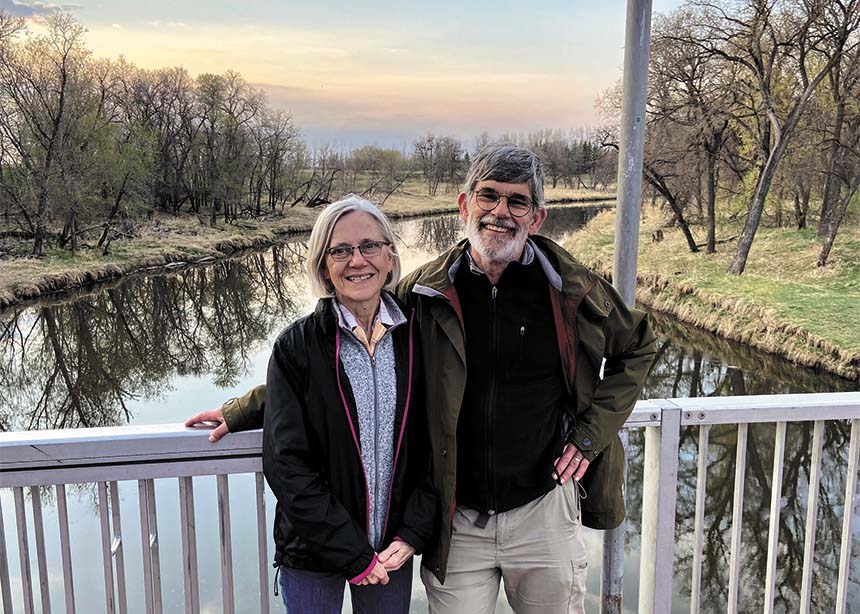My family does cancer in a big way. In my immediate family of five members, there have been 10 occasions when a doctor told one of us that we have cancer, or that, despite the treatments, the cancer has returned. My wife Esther has had two rounds of breast cancer. Our son Tim, who was born with significant physical and mental disabilities, was diagnosed with a brain tumour when he was three. Cancer took his life when he was eight.
In the last five years, I have been diagnosed with thyroid and prostate cancer. Despite surgery and treatments, both cancers have returned. Doctors now tell me that I will have cancer for the rest of my life, although various treatments should keep me alive for many years yet.
In spite of cancer, I experience my life as rich, joyful, meaningful and blessed. Numerous factors nurture my joy and gratitude, such as a loving life partner, supportive friends, family and church community, meaningful work alongside wonderful colleagues, financial security, and—not least of all—Christian faith. And I have been comforted and supported by biblical passages that I count as precious friends on my cancer journey.
Gratitude for life
The prophet Jeremiah once received a message from God for his friend and secretary Baruch: “And you, do you seek great things for yourself? Do not seek them; for I am going to bring disaster upon all flesh, says the Lord; but I will give you your life as a prize of war in every place to which you may go” (45:5).
Leaving aside the difficult issue of whether God inflicts disasters on humans, the gist of the message for Baruch is that he must give up any great expectations for his life because defeat and disaster are about to befall his nation, but God will grant him his life as a prize of war. His life, diminished as it may be, is still a gift worth being grateful for.
With the diagnosis of cancer, I have had to learn the benefits of accepting my life as a prize of war, of being grateful for life itself, even though my quality of life was not what I wished for. Despite the challenges that the cancer brings, I can be attentive to small daily blessings and potential sources of pleasure and joy.
Gratitude can be nurtured through practices given to us by our Christian tradition, for example, table grace, a simple morning prayer thanking God for a good night’s rest, and a bedtime prayer thanking God for the experiences of the day.
Settling into reality
Jeremiah wrote a letter to a group of exiles who had been dragged off to Babylonian captivity, advising them to build homes, plant gardens, raise families and seek the welfare of the city to which they had been deported (29:5-7). These exiles did not want to unpack their suitcases because they were convinced that God was about to intervene by defeating the hated Babylonians, and allowing them to return home. Jeremiah tells these exiles that their God-given calling is to accept the painful reality of their situation and make the best of it.
The various cancers in my life have taken me into exile. I have found it helpful to heed the advice of Jeremiah and accept the reality of my situation and that of my loved ones. As much as I have railed against heaven and earth, I have found it healing and life-giving to believe that God calls me to accept the painful reality that, in the midst of this journey, I am called to carry on with the mundane tasks of home-building, earning a living, tending relationships, and seeking the welfare of my community.
Embracing hope
Christians are people of hope, whose lives are not only defined by the painful realities of the present. But Christian hope is a far cry from naive optimism that every cancer story will have a happy ending.
First Peter 1:3 states, “By [God’s] great mercy [God] has given us a new birth into a living hope through the resurrection of Jesus Christ from the dead.” Christian hope involves the ability to look the crushing realities of our lives straight in the face and acknowledge how painful they are, but then, in an act of defiance, to declare that they will not define us and overtake us, because we have given our lives over to a different reality, the resurrection of Jesus Christ from the dead. The resurrection reminds us that there is always another power at work in the world besides the painful realities of the present.
Christian hope is the defiant act of clinging to, and being shaped by, the new life and healing that the resurrection of Jesus Christ makes possible already on this side of the grave, and it means facing cancer and the prospect of our own death knowing that Jesus’ entry into resurrection life is God’s promise that someday we will be privileged to follow.
Lament
“My God, my God, why have you forsaken me? Why are you so far from helping me, from the words of my groaning?” (Psalm 22:1).
When Tim had mostly recovered from the devastating side effects of the radiation and chemotherapy treatments, he suffered a stroke that robbed him of many of his physical and mental abilities, including his vision.
For months I sank into an abyss of rage and bitterness that corroded my body and soul, and my ability to be a good father and husband. The most helpful thing I learned about grief is that, when we experience a major loss, our entire being is injected with a massive dose of pain. That pain is like a poison in our body and soul, and it can destroy us if we do not release it. The process of getting the pain out is what we call healthy grieving.
Once I realized that I was a warehouse stuffed to the ceiling with unaddressed pain, I knew that I needed to grieve. Almost every day for weeks on end, I would listen to certain music and look at pictures that I knew would tap into my grief, and I would weep, often uncontrollably. I would also lament like the psalmists do, crying out my pain and rage to God, and pleading for deliverance. This lamenting was a healing process as the anger and bitterness gradually dissipated, allowing greater space in my life for love, compassion and even fragments of joy.
Praise
“Bless the Lord, O my soul, and all that is within me, bless [God’s] holy name” (Psalm 103:1).
Praise can be a radical act of hope that nurtures faith by declaring that the steadfast love of God is greater than all the powers of death arrayed against us. Defiant praise is an act of basic trust and hope through which we give our lives over to the steadfast love of God, which is strong enough to carry us through life’s difficult experiences, strong enough to empower us for faithful discipleship even in the face of hardship. Defiant praise reminds us that evil and suffering will not have the last word, but someday God’s reign will come in all its fullness and renew all of creation.
Years ago, I was preparing to teach Psalm 103 when I stumbled on a statement by Claus Westermann: “The secret of praise is its ability to make contact with God; through praise one remains with God.” Praise may help us experience some of the love, grace and power of God that we celebrate as we sing and speak our praises.
During Tim’s last month of life, he was unconscious, and Esther and I took turns keeping watch by his bed. To comfort myself and pass the time, I sang my way through our church hymnal, singing all the hymns that were familiar. I noticed that the hymns of praise affected me most powerfully. I felt guilty, and wondered how I could sing hymns of praise while I was watching Tim die.
Praise puts us in touch with God, and this connection is precisely what I needed during that difficult time. I needed to experience God’s grace, comfort and strength surrounding and sustaining me. Those hymns of praise were doing their work on me even though I was not aware at the time of how they were affecting me. When life is painful, or seems like it is spiralling out of control, praise can be a way to remain rooted in the steadfast love of God.
Remembering faithfully
Israel’s laws enjoining compassion toward vulnerable members of the community often include a motivation clause: “Remember that you were a slave in the land of Egypt” (Deuteronomy 24:18, 22).
We can choose how we will remember the individual and collective suffering that life dishes out to us. Pain and suffering can turn us into angry, bitter, frustrated people who lash out at others or nurse resentment while waiting to exact revenge. God encourages the Israelites to remember their collective trauma of Egyptian slavery differently. They are to become more empathetic, caring and committed to preventing vulnerable persons in their own community from experiencing similar exploitation and hardship.
“God is our refuge and strength, a very present help in trouble. Therefore, we will not fear, though the earth should change, though the mountains shake in the heart of the sea” (Psalm 46:1-2).
The prospect of my own death still strikes terror into my heart. Yet the Bible comes to me as a precious gift, full of potential friends and companions eager to walk with me and support me as my family does cancer in a big way.
In semi-retirement, Dan Epp-Tiessen teaches Bible part-time at Canadian Mennonite University in Winnipeg. This is adapted from a piece he wrote for Vision: A Journal for Church and Theology 22.1 (2021) and is used with permission of the Institute of Mennonite Studies.
For discussion
1. What are the biblical passages that bring you comfort when life is difficult? If you were diagnosed with a serious health condition, how would you cope? What might be your journey to being able to experience life with joy and gratitude?
2. Dan Epp-Tiessen says that he has found it “healing and life-giving” to believe that God has called him to accept the painful reality of his situation. How is this attitude different from the messages we get from mainstream society? How might this story play out if it was a book or a movie?
3. I Peter 1:3 talks about the living hope we have through the resurrection of Jesus Christ. Do Christians who suffer cling to this hope differently than those whose lives are easier? Does hope mature with age?
4. Epp-Tiessen says that the pain of loss is like a poison that needs to be released through grieving. Do you agree? In what ways does our society tend to deny or ignore loss rather than express grief? Should we re-adopt symbols of mourning such as wearing black?
5. Have you found it difficult to praise God when life is challenging? How does praise put us in touch with God?
—By Barb Draper










Leave a Reply
You must be logged in to post a comment.